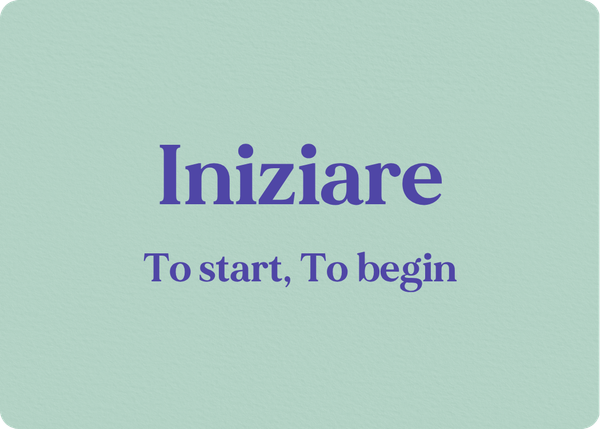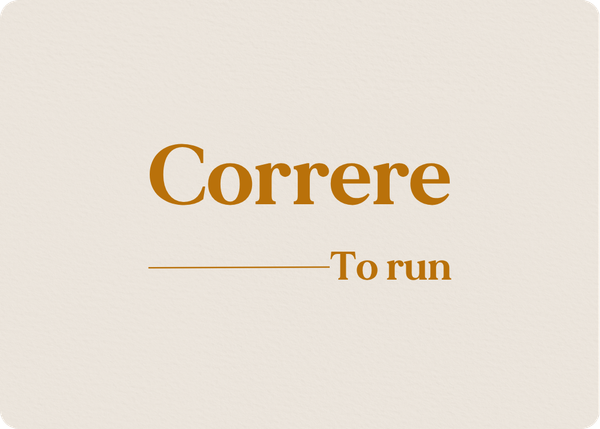What is Mangiare?
Mangiare is an Italian verb meaning "to eat", "to consume food", "to have a meal", or "to feed on". It belongs to the first conjugation (-ARE verbs) and follows the regular conjugation pattern. This verb is useful for expressing eating activities, consuming food, having meals, and describing dietary habits and food consumption.
Key Features of Mangiare:
- Type: Regular first conjugation verb (-ARE)
- Meaning: To eat, to consume food, to have a meal, to feed on
- Auxiliary verb: Uses "avere" (to have) for conjugation in compound tenses
- Past participle: Mangiato
Indicativo – Indicative Mood
Presente (Present Tense)
| Person | Conjugation |
|---|---|
| io | mangio |
| tu | mangi |
| lui/lei | mangia |
| noi | mangiamo |
| voi | mangiate |
| loro | mangiano |
Example:
Mangio la pasta tre volte a settimana.
I eat pasta three times a week.
Passato Prossimo (Present Perfect)
| Person | Conjugation |
|---|---|
| io | ho mangiato |
| tu | hai mangiato |
| lui/lei | ha mangiato |
| noi | abbiamo mangiato |
| voi | avete mangiato |
| loro | hanno mangiato |
Example:
Hai mai mangiato i tortellini in brodo?
Have you ever eaten tortellini in broth?
Imperfetto (Imperfect)
| Person | Conjugation |
|---|---|
| io | mangiavo |
| tu | mangiavi |
| lui/lei | mangiava |
| noi | mangiavamo |
| voi | mangiavate |
| loro | mangiavano |
Example:
Da bambino mangiavo sempre i dolci di nascosto.
As a child, I always ate sweets in secret.
Trapassato Prossimo (Past Perfect)
| Person | Conjugation |
|---|---|
| io | avevo mangiato |
| tu | avevi mangiato |
| lui/lei | aveva mangiato |
| noi | avevamo mangiato |
| voi | avevate mangiato |
| loro | avevano mangiato |
Example:
Daniele ci disse che aveva mangiato un panino prima di uscire di casa.
Daniele told us he’d eaten a sandwich before leaving the house.
Passato Remoto (Simple Past)
| Person | Conjugation |
|---|---|
| io | mangiai |
| tu | mangiasti |
| lui/lei | mangiò |
| noi | mangiammo |
| voi | mangiaste |
| loro | mangiarono |
Example:
Nel giro di poche ore mangiarono tutto quello che avevano cucinato.
In just a few hours, they ate everything they had cooked.
Trapassato Remoto (Past Anterior)
| Person | Conjugation |
|---|---|
| io | ebbi mangiato |
| tu | avesti mangiato |
| lui/lei | ebbe mangiato |
| noi | avemmo mangiato |
| voi | aveste mangiato |
| loro | ebbero mangiato |
Example:
Non appena ebbe mangiato, si sentì meglio.
As soon as he had eaten, he felt better.
Futuro Semplice (Simple Future)
| Person | Conjugation |
|---|---|
| io | mangerò |
| tu | mangerai |
| lui/lei | mangerà |
| noi | mangeremo |
| voi | mangerete |
| loro | mangeranno |
Example:
Mangerò un piatto leggero per cena.
I’ll eat something light for dinner.
Futuro Anteriore (Future Perfect)
| Person | Conjugation |
|---|---|
| io | avrò mangiato |
| tu | avrai mangiato |
| lui/lei | avrà mangiato |
| noi | avremo mangiato |
| voi | avrete mangiato |
| loro | avranno mangiato |
Example:
Avrò mangiato troppo?
Will I have eaten too much?
Congiuntivo – Subjunctive Mood
Presente (Present Subjunctive)
| Person | Conjugation |
|---|---|
| che io | mangi |
| che tu | mangi |
| che lui/lei | mangi |
| che noi | mangiamo |
| che voi | mangiate |
| che loro | mangino |
Example:
Mi fa piacere che mangiate con noi stasera.
I’m glad you’re eating with us tonight.
Passato (Past Subjunctive)
| Person | Conjugation |
|---|---|
| che io | abbia mangiato |
| che tu | abbia mangiato |
| che lui/lei | abbia mangiato |
| che noi | abbiamo mangiato |
| che voi | abbiate mangiato |
| che loro | abbiano mangiato |
Example:
Temo che tu abbia mangiato qualcosa che ti ha fatto male.
I’m afraid you ate something that upset your stomach.
Imperfetto (Imperfect Subjunctive)
| Person | Conjugation |
|---|---|
| che io | mangiassi |
| che tu | mangiassi |
| che lui/lei | mangiasse |
| che noi | mangiassimo |
| che voi | mangiaste |
| che loro | mangiassero |
Example:
Se mangiassi di più, avresti più energie.
If you ate more, you’d have more energy.
Trapassato (Past Perfect Subjunctive)
| Person | Conjugation |
|---|---|
| che io | avessi mangiato |
| che tu | avessi mangiato |
| che lui/lei | avesse mangiato |
| che noi | avessimo mangiato |
| che voi | aveste mangiato |
| che loro | avessero mangiato |
Example:
Sembrava come se non avessero mai mangiato prima!
It looked like they had never eaten before!
Condizionale – Conditional Mood
Presente (Present Conditional)
| Person | Conjugation |
|---|---|
| io | mangerei |
| tu | mangeresti |
| lui/lei | mangerebbe |
| noi | mangeremmo |
| voi | mangereste |
| loro | mangerebbero |
Example:
Mangerei volentieri un bel pezzo di crostata.
I’d really like a nice slice of pie.
Passato (Past Conditional)
| Person | Conjugation |
|---|---|
| io | avrei mangiato |
| tu | avresti mangiato |
| lui/lei | avrebbe mangiato |
| noi | avremmo mangiato |
| voi | avreste mangiato |
| loro | avrebbero mangiato |
Example:
Avreste mangiato meglio, se aveste scelto un altro ristorante.
You would’ve eaten better if you’d chosen another restaurant.
Imperativo (Imperative)
| Person | Conjugation |
|---|---|
| (tu) | mangia |
| (lui/lei) | mangi |
| (noi) | mangiamo |
| (voi) | mangiate |
| (loro) | mangino |
Example:
Mangia la minestra prima che si raffreddi!
Eat the soup before it gets cold!
Indefinite Moods
Infinito (Infinitive)
- Presente (Present): mangiare (to eat)
- Passato (Past): avere mangiato (to have eaten)
Examples:
È importante mangiare in modo sano.
It’s important to eat healthily.
Pensavo di aver(e) mangiato abbastanza, ma ho ancora fame.
I thought I had eaten enough, but I’m still hungry.
Participio (Participle)
- Passato (Past): mangiato (eaten)
Example:
Il pesce mangiato ieri era freschissimo.
The fish eaten yesterday was super fresh.
Gerundio (Gerund)
- Presente (Present): mangiando (eating)
- Passato (Past): avendo mangiato (having eaten)
Examples:
Mangiando lentamente, assapori meglio il cibo.
By eating slowly, you savor the food better.
Avendo mangiato poco durante il giorno, si concesse un dolce.
Having eaten little during the day, he treated himself to a dessert.
The verb Mangiare at a glance: Key tenses you need
| Present | Present Perfect | Imperfect | Present Subjunctive | Imperfect Subjunctive | Conditional Present |
|---|---|---|---|---|---|
| io mangio | io ho mangiato | io mangiavo | che io mangi | che io mangiassi | io mangerei |
| tu mangi | tu hai mangiato | tu mangiavi | che tu mangi | che tu mangiassi | tu mangeresti |
| lui/lei mangia | lui/lei ha mangiato | lui/lei mangiava | che lui/lei mangi | che lui/lei mangiasse | lui/lei mangerebbe |
| noi mangiamo | noi abbiamo mangiato | noi mangiavamo | che noi mangiamo | che noi mangiassimo | noi mangeremmo |
| voi mangiate | voi avete mangiato | voi mangiavate | che voi mangiate | che voi mangiaste | voi mangereste |
| loro mangiano | loro hanno mangiato | loro mangiavano | che loro mangino | che loro mangiassero | loro mangerebbero |
Conclusion
Mastering the conjugation of "mangiare" is important for expressing eating activities, food consumption, and dining experiences in Italian. As a regular first conjugation verb, it follows a predictable pattern throughout all tenses and moods.
Remember the key points:
- Uses "avere" as auxiliary verb in compound tenses
- Regular -ARE verb following standard first conjugation patterns
- Past participle is "mangiato"
- Essential for nourishing the body, satisfying hunger, enjoying culinary pleasures, and participating in social dining rituals
Keep practicing with real sentences and contextual examples to master this Italian verb!





